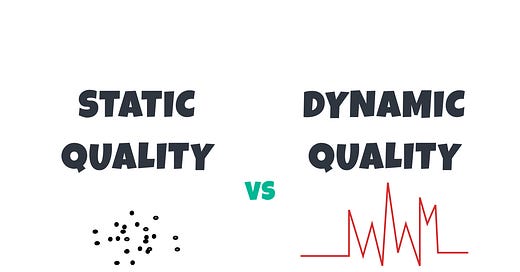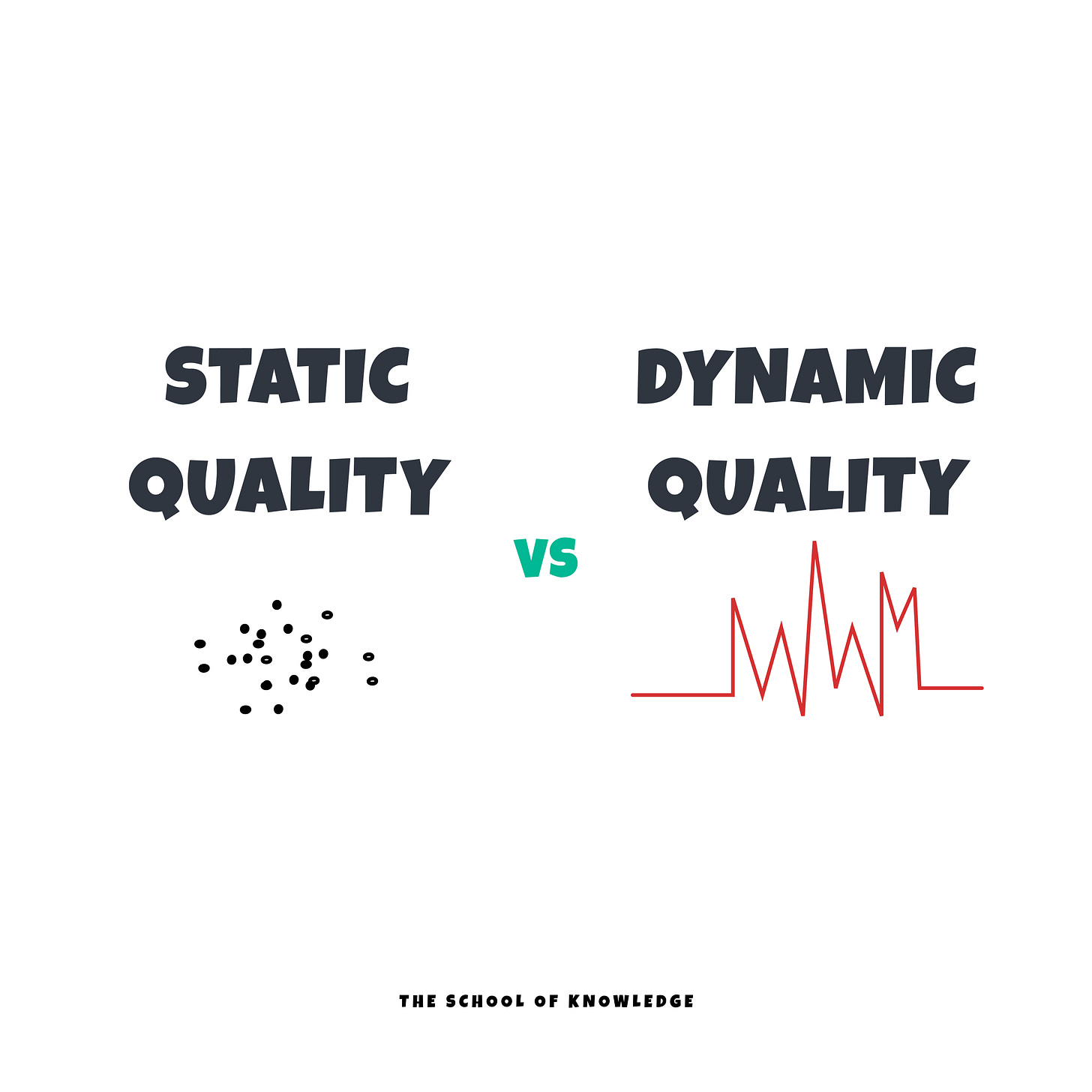Why Quality is the Most Important Aspect of any System
The concept of static and dynamic quality for systems thinkers
Welcome to the 1,008 people who have joined the community since my last post. If you haven’t yet subscribed, join 5,486 lifelong learners here:
What is quality? It's a word we see and hear every day. We talk about it, seek quality products, quality service, quality time, quality work, and quality relationships, but if I asked you to define it- could you?
Your first attempt might be that quality is something that’s good but why not just stop at good? After all, good is easier to define than quality because its opposite is bad, but what's the opposite of quality? Non-quality?
Is quality a thing or an idea? Can it be touched, held, or grabbed, or is it something that exists only in our minds? An abstraction. If it exists in our mind and in the minds of others, is it the same quality that we're thinking of?
How is it that some things are quality and others are not? Is quality permanent or fleeting? If we can freely choose to say or define something as quality can we trust it?
Is quality a process or an endpoint? It’s easy to see quality as the product- that is, the endpoint, but I think it's the process. It's the details, methodology, patience, persistence, imagination, and curiosity that produce the quality. The thing, the endpoint (F1 championship-winning car, award-winning film, hand-made oak dining table,) wouldn't be quality if not for the aforementioned, because cars and films and tables don't just invent themselves. We do.
Quality is in the pursuit of something.
There's also a certain quality that people can have, you know? They “Just have that certain quality,” you can't quite define but know it is there nonetheless. Perhaps it's the ability to have people shut up and listen when they speak or an aura they have when they walk into a room. But it's a certain quality for sure. We know when we find people like this because it's glaringly obvious they possess such quality, and I'm certain it's why people package up seminars and workshop retreats to sell to quality-seeking enthusiasts. But, quality isn't something you can buy in this sense. You can buy quality face cream or quality food ingredients but there's nothing worse than phoney qualities in people, is there?
Quality is personal.
Why should we even care about quality, anyway? Because quality itself reveals care. It shows those who are looking that somebody made a great effort to produce it. Effort and care succeed quality. Do you care enough to create something meaningful?
Quality is the process of caring.
If you're a sloppy thinker the six days of the week you aren't working on your machine, what trap avoidances, what gimmicks, can make you all of a sudden sharp on the seventh? It all goes together. The real cycle you're working on is a cycle called yourself. The machine that appears to be 'out there' and the person that appears to be 'in here' are not two separate things. They grow toward Quality or fall away from Quality together.
- Robert Pirsig
The process of building muscle, hypertrophy is quality-centric. It relies on quality input by the trainee to build muscle. One of the ways you contribute to this input is the ‘quality’ of your reps. But what is a quality rep? A quality rep in accordance with building muscle is about the connection you feel in the muscle when moving weight. If connection isn’t a definition of quality then I don’t know what is.
Quality is connection.
So what does quality have to do with systems? Quite a lot I think. Everything unnatural is produced by human behaviour and if our quality meter isn't calibrated correctly from the start, how can we expect quality to be produced at the end point?
Robert Pirsig, author of Zen and the Art of Motorcycle Maintenance and Lila, conjured up two definitions of quality: static and dynamic. Static quality is the status quo- it's our education systems, justice systems, traffic light systems and all the things that maintain order. It offers stability, and without it, chaos would ensue. Dynamic quality, on the other hand, is the "pre-intellectual cutting edge of reality" and offers freedom and newness. It abhors static patterns of quality and is constantly seeking newer ways of doing things. In battle with each other, we can not survive without the both of them. Static quality maintains our progress, but dynamic quality creates it. They balance.
So where do you start?
Well, systems need goals to act as the direction setters. A sort of compass, train track or other nice metaphor you can think of. If you're designing systems ask yourself what's your goal? Is it to preserve, maintain or protect something or are you seeking to explore, find and accomplish?
Systems that have dynamic behaviour are emergent, adaptive and resilient and often show us new ways, perspectives and values that were hidden beforehand. But dynamic quality can be chaos, and this is why static quality acts more like a ballast than a metaphorical dinosaur clinging on to outdated values, principles and behaviours.
Human history is just a constant renegotiation between existing and new patterns of value. Of static and dynamic quality.
Quality, good and bad, permeates everything we touch in life. We all speak of it like we know it like the back of our hands, yet people are lacking so much of it. When I read Zen and the Art of Motorcycle Maintenance and Lila late last year, Robert Pirsig’s Metaphysics of Quality left a permanent mark on my thinking, and I can think of no better pursuit in seeking quality than in the systems we create as humans.
If you're looking to create systems, then start with quality. There can be no other place.
Until next time, Karl (The School of Knowledge).
Whenever you’re ready
The School of Knowledge helps you understand the world through practitioners. Those who try, fail and do (skin in the game). 📚💡
Join our growing community of like-minded lifelong learners here:





What a brilliant read. Thanks for this.
Omg! This morning I ran a workshop where one of the exercises was a free write or speak on this question: “What is quality?”
It’s one of my favourite questions I ask myself regularly. (Haven’t read your piece yet - will do now.)